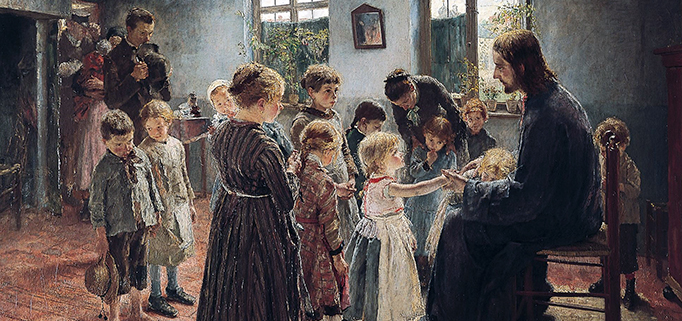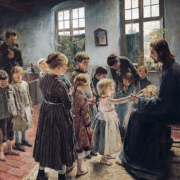Choosing a Catholic School Begins with Mission
With Catholic Schools Week upon us (Jan. 28-Feb. 3), families are invited to recommit to Catholic education and register their children for the upcoming school year. Others who are exploring Catholic schools may benefit from a new Parents Guide to understanding the nature and benefits of a faithful, excellent Catholic education.
The higher graduation rates and college acceptance rates of students in Catholic schools are well-documented — but as impressive as these statistics are, they are of secondary importance. The real value of Catholic schools is not what they prepare students to do (go to college, earn high paying wages) but what they prepare them to be — a leaven to society and saints!
Because of this higher and broader horizon, parents should look not only at test scores and college admission rates but also at the strength and wholesomeness of the school’s Catholic culture and how explicitly it accomplishes its Catholic mission.
How is a parent to begin this daunting task? The Cardinal Newman Society has articulated the Church’s expectations as Principles of Catholic Identity in Education, and it has issued a Parents Guide to help families gauge the particular strengths and weaknesses of a Catholic school in key areas: curriculum, community, leadership, faculty and student outcomes. These are some highlights:
Curriculum
The curriculum should advance the mission of Catholic education, with abundant evidence that the faith informs all academic disciplines.
Is there evidence that the Catechism of the Catholic Church and Scripture are frequently referenced? Are textbooks supplemented with resources to help ground them in the Catholic faith and reflect a Catholic worldview?
Are students exposed to the best of Western civilization and culture, and do they understand the harmony which exists between faith and reason, especially in the study of the sciences?
Do literature selections assist the genuine development of the human person by using examples of virtue and vice, which allow students the opportunity to enter into the lives of others so as to learn examples of nobility and courage?
Does the social studies curriculum help students understand and commit to the common good, the needs of the poor, human rights and human dignity?
If human sexuality classes are taught, are they fully transparent, in line with Church teaching and respectful of parents as the primary educators?
Community
In Catholic education, parents are partners with the school. They participate in school liturgies and academic and extra-curricular events.
The school climate reproduces the warm and intimate atmosphere of family life, which is not only nurturing but genuinely positive and supportive.
Is an evangelical spirit of freedom and charity evident within the school? Are students challenged to strive for excellence in both human and Christian formation? Are virtues such as magnanimity, honor and modesty taught and evident? Are there opportunities and requirements for service?
Catholic education is in full communion with the Catholic Church and helps grow the Church. Are there activities, clubs and events that invite a deeper understanding of the Catholic teachings and traditions? Does the school display a concern for the life and problems of the Church, both local and universal? Are Catholic students helped to become active members of their parish communities? Is prayer a norm, and are Masses and Reconciliation frequent and reverent?
Leadership
Opportunities for students to encounter the living God in a Catholic school depend heavily on a faith-filled leader who sets the tone and brings the community together under a common vision and mission.
Do leaders accept and promote the teachings of the Church and moral demands of the Gospel? Do they actively participate in the liturgical and sacramental life of the school and provide an example to others who find in them nourishment for Christian living? Do they see their position as a vocation rather than a profession and attempt to fully integrate their faith life with their daily decision-making?
Faculty
Because a school depends chiefly on teachers to achieve its purpose, parents should give careful attention to the teachers and their effectiveness at imitating Christ, the true teacher, not only in their work but in the entirety of their lives and actions.
Are the faculty exemplary apostolic witnesses to the Catholic faith, and do they live their lives according to the teachings of the Church? Are they present at school Masses and other religious activities, and are they active in their parishes and local communities? Are they alert for opportunities to integrate culture and academic content with faith to create a synthesis of faith and life for their students?
Student Outcomes
Catholic education provides for the integral formation of students in body, mind and spirit. Students, once individually formed, can advance the Christian formation of the world and ultimately take their place in the eternal Kingdom.
With this dual outcome of securing both the common and individual good, parents can ask: In what ways are graduates using their formation to aid society as a whole, to assist in the building up of impoverished communities, helping the poor or in other ways facilitating the efforts of the universal Church?
Guiding Models of Catholic Education
It may seem daunting for parents to assess these areas on their own when selecting a Catholic school. Fortunately, some schools have proactively taken up the challenge of answering such questions related to strong Catholic identity by seeking recognition from the National Catholic Honor Roll.
The Honor Roll schools complete an extensive battery of questions after spending many hours of reflection on how effectively they are fulfilling the Church’s expectations for Catholic education. Parents may want to spend some time on these schools’ websites to get a sense of what a strong Catholic school looks like and compare them to their local schools.
The Church grows when parents and schools find and support each other in the quest for excellence in Catholic education, which starts and ends with Christ and is sustained by truth and by love.
During this Catholic Schools Week, all are encouraged to renew their commitment to authentic Catholic education wherever it is found.
This article was originally published at the National Catholic Register.




 Photo by David Mark via Pixabay CC0
Photo by David Mark via Pixabay CC0

